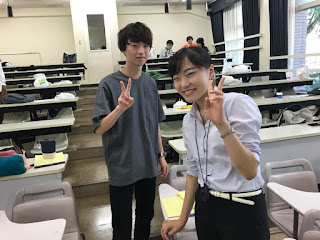10月初旬に行われたBP Novice Eastに際して、JPDU代表の有元さんから寄稿文をいただきました。
優勝、Best Speakerという快挙、本当におめでとうございます!
例年は一年生と二年生のペア(または一年生同士のペア)が優勝をかけて争う大会だったBP Noviceですが、今年は一年生と二年生以上の大学生/大学院生のペアが出場するPro-Am大会として生まれ変わりました。
今年はJPDUとして、様々な改革を行おうと試行錯誤しております。
そんなJPDUを引っ張ってくださっている有元さんは、本当に素晴らしい方ですね!!!
ということで、ブログの中身もみなさん必見となっております!
大会に参加された方もそうでない方も、是非是非お楽しみください!!!!!
〜〜〜〜〜
はじめに
こんにちは、UTDS4年の有元万結です。実は高校同期である木對さんから、JPDUブログへの寄稿文のお話をいただき、大変光栄です。BP Novice Eastでは、UTDS一年の松村広大くんと組みました。この記事では大会前の準備、大会中、そして全体を終えた感想という順番で書かせていただきます。
良いチーム写真ですね〜〜〜〜〜〜〜!
1. 大会前の準備
チームが決まったのが秋Tの少し前でノービスは10月の初旬だったため、練習をする期間は特別長くありませんでした。通常の駒場での練習を2ラウンド、前日のJPDU練習会で2ラウンド、またプレパ練習を何回かして、本番に臨みました。最初の方のラウンドでは、そもそもどっちがどのポジションをやるか、どうプレパをするか、ラウンド中にどうアーギュメントを共有するかなど、コミュニケーションが少し難しかったように感じます。
また、今回のノービスではモーションの課題記事があったので、それをそれぞれ読むとともに、それぞれの記事から出されそうなモーションを考える練習をしました。どこから始めればいいかわからないということがよく指摘されるIRですが、個人的にはこのようにリサーチするといいかなと思います。
1 学校の授業(例えば私の大学だと、現代中国の政治、現代アメリカ政治、ヨーロッパ政治史、ラテンアメリカ政治などの講義が開催されています。)授業は、体系的に、かつ効率的に政治について学べるいい機会だと思うのでぜひ通ってみてください。同じ路線で教科書も結構いいと思います。IRの教科書というよりは、歴史の教科書、近代史の教科書をバーっと読むといいですね。
2 日々のニュース:これは日本のヤフーニュースでもないより全然いいです。最初は体力つけることが大事なので、日本語の新聞でも読みやすいやつを読む練習をするといいかなと思います。習慣がついてきた方は、続けられる範囲でForeign Affairs, Foreign Policy, the Diplomat, the Economistなどを読むといいかなと思います。普通の新聞よりもう少し深い分析がある雑誌です。英語読むのが得意な方は、BBC, the Guardian, New York Times, Slate, the Atlantic, New Yorkerなどを、海外ディベーターは読んでいる印象なので、ぜひ当たってみてください。
3 モーションベースのリサーチ:そもそもこれって何?という感じでウィキペディアを読むことが最初です。(英語版のウィキは大変オススメです。)ただ、ウィキペディアだと情報過多に陥りやすいので、よくBBCに本当に概略的にまとまっていることがあるのでそういうのも当たってみてください。
4 追加で:Youtube のcaspian reportめちゃオススメです。わかりやすいですし分析もしっかりしていると思います。こんな感じで好きなものを見つけて持続的にして行くのが大事だと思います。
ただ、少し注釈として加えたいのは、IRはリサーチしすぎても勝てない、ということです。情報が多いことより、きちんとハーム?ベネフィット?が大事に見えることがIRで勝つのに一番大事だし、それをすることがIRは情報がありすぎるため非常に難しいと思います。なのでリサーチは大事ですが、end all be all solutionではないことに注意していきたいですね(自戒の意も込めて)。
大会
ここではラウンドの様子の共有より、ノービスのACの趣旨に合わせ、使えそうな記事を貼り付けていきたいと思います。
ラウンド① (CO)
THW not give medical treatment to patients of attempted suicide
概論:
https://ja.wikipedia.org/wiki/自殺#リスクファクター
Government:
https://ja.wikipedia.org/wiki/蘇生措置拒否
https://ja.wikipedia.org/wiki/尊厳死
https://ja.wikipedia.org/wiki/自己決定権
(どっちでも使える) https://www.nytimes.com/2016/11/08/well/live/after-a-suicide-attempt-the-risk-of-another-try.html
Opposition:
https://www.businessinsider.com/many-suicides-are-based-on-an-impulsive-decision-2014-8
https://www.psychologytoday.com/us/blog/out-the-darkness/201109/the-jumpers
https://www.theatlantic.com/magazine/archive/2017/09/has-the-smartphone-destroyed-a-generation/534198/
ラウンド② (OG)
(長いインフォスライドの後)THR the China Vatican deal on the appointment of bishops
https://ja.wikipedia.org/wiki/中国の宗教#中華人民共和国
https://ja.wikipedia.org/wiki/中国のキリスト教
https://www.reuters.com/article/us-china-vatican-pope-deal/vatican-deal-with-beijing-leaves-some-key-questions-unresolved-idUSKCN1MA0D6
Government:
https://www.sankei.com/premium/news/180926/prm1809260012-n1.html
https://www.nikkei.com/article/DGXMZO35780360W8A920C1FF1000/
https://thediplomat.com/2018/09/what-the-china-vatican-deal-means-for-taiwan/
Opposition:
https://www.sankei.com/world/news/180925/wor1809250015-n1.html
https://www.ncronline.org/news/opinion/vaticans-deal-china
ラウンド③ (CG)
THBT liberal democracies should actively combat the rise of right wing populism
https://ja.wikipedia.org/wiki/右翼ポピュリズム
https://ja.wikipedia.org/wiki/右派ポピュリズムの概要
(なお同じきじの英語版の方がわかりやすいし正確だと思います。)
http://nottspolitics.org/2017/10/31/populist-and-extreme-parties-to-ban-or-not-to-ban/
https://www.nytimes.com/interactive/2016/world/europe/europe-far-right-political-parties-listy.html
Government:
https://www.theatlantic.com/magazine/archive/2018/10/poland-polarization/568324/
https://www.vox.com/policy-and-politics/2018/9/13/17823488/hungary-democracy-authoritarianism-trump
Opposition:
https://www.theguardian.com/commentisfree/2011/may/12/fight-xenophobic-populists-need-free-speech
https://www.theguardian.com/books/2018/may/23/thomas-frank-trump-populism-books
(正当性がある、という観点では)
ラウンド④ (OO)
THBT the feminist movement should seek a ban on contents that sexually objectify women
https://en.wikipedia.org/wiki/Sexual_objectification
https://en.wikipedia.org/wiki/Male_gaze
https://plato.stanford.edu/entries/feminism-objectification/
https://en.wikipedia.org/wiki/Feminist_views_on_pornography
https://www.theatlantic.com/national/archive/2010/03/pros-and-cons-of-porn/346134/
Government:
https://www.washingtonpost.com/news/in-theory/wp/2016/05/24/the-case-for-banning-pornography/?noredirect=on&utm_term=.09a7d02206d3
https://www.theguardian.com/commentisfree/2014/oct/24/pornography-world-anti-porn-feminist-censorship-misogyny
Opposition:
https://qz.com/india/1290332/india-should-legalise-porn-argues-richa-kaul-padte-author-of-cybersexy/
もし参考になれば幸いです。特にStanford のPhilosophyは非常に使えるので、ぜひ他の記事も読むといいと思います。
ラウンド全て終了後
最初の3ラウンドはなんとか一位を取ることができましたが、最後のラウンドは私がケースを失敗してCOに抜かれてしまったので、少ししょんぼりしながらクロージングセレモニーに向かいました。クロージングセレモニーで、自分が表彰されたのはもちろんなのですが、何より組んでくれた松村くんがルーキースピーカーに入ったことが一番嬉しかったです。先輩としての任が少し果たせたのかな、とお思いました。組んでくれてありがとう、そしてこれからも頑張ってください。
松村さん、一年生ながらに素晴らしいスピーチをなさっていました!
本当におめでとうございます!
終わりに
今年のBPノービスは形式をプロアムに変えて、二年生以上の先輩も出場できるようにしました。同時に、なるべく多くの先輩が出場できるように、従来二日間であった大会を1日に変更しました。
このような変更をした理由としては、一年生と一緒に出場できるBP経験の豊富な先輩の母数を増やしたかったからです。私が二年生の時にBPノービスに出場した際、自分はまだまともにBPが理解できていない中で、どうやったら後輩に教えられるのか、非常に悩みました。また、例年、先輩の数が足りず先輩と一緒に出場できない一年生がどうしても出てしまいます。母数を増やせばこの問題もある程度解消できるのではないかと思いました。
結果的には、二日間大会の方がラウンドの数も増やせてよかったとは思いますが、3・4年生の出場を認めるという観点では来年以降もこの形式をとっていいのではないかと思いました。当日聞いた声の中で印象的だったのは、3・4年生がディベートできるようになったので2年生がOBOGとともにジャッジに入ることができ、なかなか通常だと身につけづらいBPジャッジのやり方について学べた、ということでした。BPスタイルは非常に難しいとは思いますが、この形式だと効果的に、ジャッジの能力もディベーターとしての能力もディベートコミュニティとして育ていけるのではないかと思います。
これを可能にしてくださった、TDの小池くんはじめコミの皆様、また浦野くんはじめACの皆様に大変感謝いたします。ありがとうございました。
JPDU代表はさすがですね〜〜〜〜!
本当に尊敬しています。
これからも日本のディベート界を引っ張って行ってください!
〜〜〜〜〜







